
The Arctiinae are a large and diverse subfamily of moths with around 11,000 species found all over the world, including 6,000 neotropical species. This subfamily includes the groups commonly known as tiger moths, which usually have bright colours, footmen, which are usually much drabber, lichen moths, and wasp moths. Many species have "hairy" caterpillars that are popularly known as woolly bears or woolly worms. The scientific name Arctiinae refers to this hairiness. Some species within the Arctiinae have the word "tussock"' in their common names because they have been misidentified as members of the Lymantriinae subfamily based on the characteristics of the larvae.
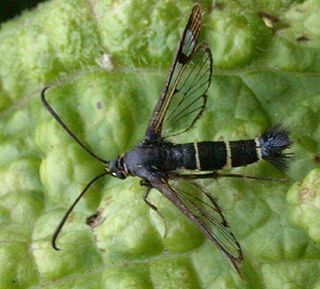
The Sesiidae or clearwing moths are a diurnal moth family in the order Lepidoptera known for their Batesian mimicry in both appearance and behaviour of various Hymenoptera.

Heliothis is a genus of moths in the family Noctuidae. It was first described by Ferdinand Ochsenheimer in 1816. Some of the species have larvae which are agricultural pests on crop species such as tobacco, cotton, soybean and pigeon pea. Some species originally in this genus have been moved to other genera, see Chloridea and Helicoverpa.

Lycomorpha is a genus of moths in the family Erebidae. The genus was erected by Thaddeus William Harris in 1839.
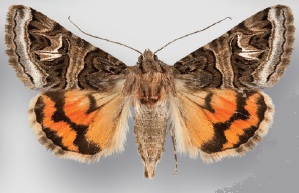
Drasteria is a genus of moths in the family Erebidae.

Catocala miranda, the Miranda underwing, is a moth of the family Erebidae. The species was first described by Henry Edwards in 1881. It is found in the US from Illinois, Pennsylvania and Massachusetts to Florida and west to western North Carolina.
Carmenta corni, the aster borer moth, is a moth of the family Sesiidae. It was described by Henry Edwards in 1881. It is known from North America, including Wisconsin.

Carmenta giliae is a moth of the family Sesiidae. It was described by Henry Edwards in 1881, and is found from western Alberta to north-western British Columbia, south to Arizona and New Mexico. The habitat consists of mid-to-high elevation montane meadows.
Carmenta texana, the Texana clearwing moth, is a moth of the family Sesiidae. It was described by Henry Edwards in 1881 and is known from the US states of Texas and Florida.
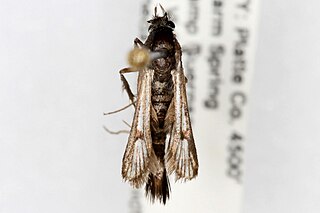
Carmenta verecunda is a moth of the family Sesiidae. It was described by Henry Edwards in 1881, and is known from the United States, including Colorado, Utah, California and Arizona.

Lycomorpha pholus, the black-and-yellow lichen moth, is a moth in the family Erebidae. It is found in North America from Nova Scotia to North Carolina, west to South Dakota and Texas. The habitat consists of short-grass prairie.
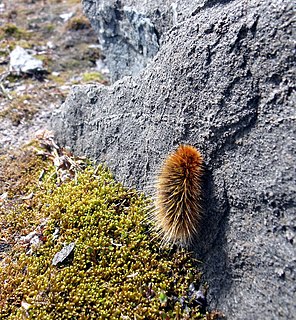
Arctia opulenta is a moth of the family Erebidae. It was described by Henry Edwards in 1881. It is found from Alaska through northern British Columbia to Labrador. The habitat consists of arctic tundra and alpine and subalpine tundra.
Spiniphallellus is a genus of moths in the family Gelechiidae.
Spiniphallellus desertus is a moth of the family Gelechiidae. It is found in Uzbekistan, Turkmenistan, Kazakhstan and Russia.
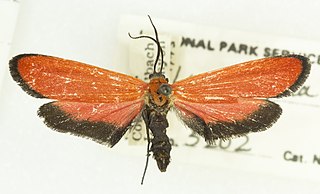
Lycomorpha grotei, or Grote's lycomorpha moth, is a moth of the family Erebidae. It was described by Alpheus Spring Packard in 1864. It is found in North America, including Arizona, California, Colorado, Montana, Nevada, South Dakota, Texas, Utah and Wyoming.
Lycomorpha regulus is a moth of the family Erebidae. It was described by Fordyce Grinnell Jr. in 1903. It is found in North America, including Arizona, California, Colorado and Utah.
Lycomorpha fulgens is a moth of the family Erebidae. It was described by Henry Edwards in 1881. It is found in North America, including Arizona, California, Colorado and New Mexico.
Lycomorpha splendens is a moth of the family Erebidae. It was described by William Barnes and James Halliday McDunnough in 1912. It is found in North America, including Arizona, California, Nevada, New Mexico, Texas and Utah.

The Cisthenina are a subtribe of lichen moths in the family Erebidae, currently containing 428 described species.









